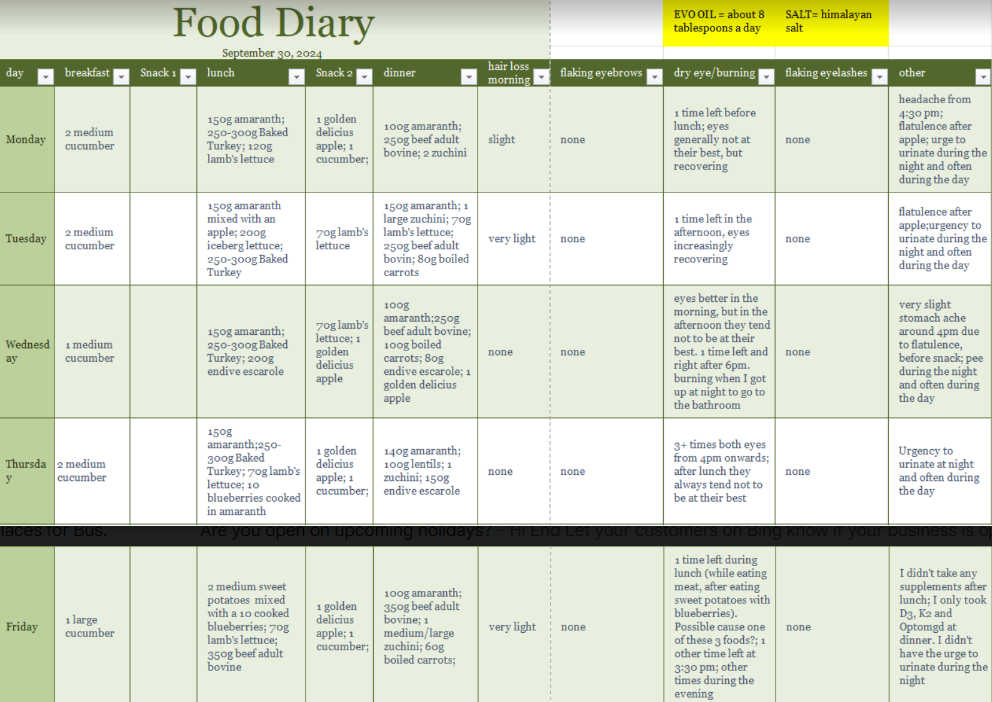Symptom Journal Helpful for Mast Cell Activation (MCAS)
 When I first started working with clients who had complex chronic illnesses, it was hard to connect the dots. Though I had some success, it was more difficult than I anticipated. Because of this, I decided to start requiring a dietary/symptom journal. This was an absolute game-changer for my clients. Now, we both could clearly see what was causing their flare-ups. No longer was it about figuring out which supplement to take. Now, it was about coaching people through the changes they needed to make.
When I first started working with clients who had complex chronic illnesses, it was hard to connect the dots. Though I had some success, it was more difficult than I anticipated. Because of this, I decided to start requiring a dietary/symptom journal. This was an absolute game-changer for my clients. Now, we both could clearly see what was causing their flare-ups. No longer was it about figuring out which supplement to take. Now, it was about coaching people through the changes they needed to make.
In this article, I will discuss one of my favorite topics: symptom journals. Without this strategy, figuring out what is happening in most MCAS cases would be impossible. For this reason, I wanted to share my method with you.
Why Journaling is Key to MCAS Recovery
Helps You Uncover Hidden Food Triggers
Journaling what you eat and how you feel can help you identify the things that don’t match with you. Also, the journal is important because the foods that trigger you are also the ones you prefer most. Unless you can see symptoms worsening on multiple occasions after consuming this food, you will not believe that it is triggering you. This is why the data is so important. If you see the last time you consumed this thing your symptoms worsened too, then eventually you will make the change.
Easy to Make Correlations/See Patterns
If you keep things simple enough, you should be able to identify the causes of any MCAS flare-ups. For example, if you were to eat oats twice per week and noticed itchiness on your skin shortly after eating it both times, then your mast cells don’t like it. Once you see the same food or environment causing you issues on multiple occasions, then it’s relatively conclusive. Without completing a symptom log, you may have just continued to make the counterproductive decision and not understood why you didn’t feel well. This is why it’s vital to start journaling for MCAS.
Log Data is Irrefutable and Unbiased
When you’re telling people to stop eating things they like, it’s a tough conversation. Most of the time, they are defensive of the things that trigger them because they initially get relief from it. For this reason, it’s extremely difficult to convince people to make changes unless they see the data right in front of them. With the dietary/symptom log, the information is undeniable. If the person doubts something, all they have to do is go back to the last few times they did the same thing and see what happened. The same goes for environmental and stress triggers. With enough history, we can see correlations that will help us escape the cycle of self-sabotage.
Helps Identify Environmental Triggers
If you start to notice that there are certain places that make your symptoms flare up, then there might be a problem with your home environment too. When you use a symptom journal, you can log the changes in your environment and how you felt. This will help you identify if the environment causing your symptoms to worsen.
For example, when I sent my daughter to her school, she would progressively look worse over the course of the week and then start to look better over the weekend. Every week, she looked worse earlier in the week. At one point, it hit a threshold where I realized there was something in the building that was irritating her significantly. This helped me make the decision to remove them from the school, which was an absolute game-changer. If I hadn’t documented everything closely with pictures and notes, I wouldn’t have been able to make the decision confidently.
Increases Accountability/Adherence to Plan
It’s easy to say you will do something, but it’s harder to do it. It’s even harder when you do not write down what you’re doing daily. If you journal the foods you eat and make the wrong choices, you will see the results right in front of you. In addition, you will not want to make the wrong choices because it feels like you’ve let yourself down while journaling the entry. For these reasons, symptom journals can be very helpful. They can increase your accountability to the promises you’ve made to yourself, and this helps you adhere to the overall plan.
Teaches You How to Listen to Your Body
Most people have never tried to pay attention to the signs their bodies send. In contrast, most people try to ignore the symptoms and push on. By utilizing a symptom log for MCAS, you start to train yourself to look closely at the changes in how you feel throughout your day. Eventually, you get very good at noticing when anything shifts. This increase in awareness is probably the most valuable gift journaling can give you. Healing from mast cell activation is about learning how to listen to your body again and having enough self-respect to make changes based on what it tells you.
Identifies Safe Portion Sizes that Work
There may be certain foods that you can eat in smaller portions and get away with. For example, you may be able to eat a half serving of hummus and be fine, but when you eat a whole serving, your stomach feels bloated. Does this mean that you shouldn’t ever eat hummus again? No, it means you should consume it infrequently, in an amount that doesn’t aggravate your symptoms. When you use a dietary/symptom log, it’s very easy to identify the proper portion sizes for the slightly riskier foods.
Helps You See Your Role in MCAS Recovery
Before I started symptom journals, I thought the answer to my health problems was outside of myself. I believed that I would find a supplement that would help me to become better, but I did not have any interest in changing my behavior. Overtime, I realized that I would only get so far if I kept doing the same things. With this in mind, I started to experiment by changing things in my diet/environment and logging it. Eventually, the log data became my best friend. It pointed me in the direction of a real recovery that was dependent upon the choices I was making, not some pill.
To truly recover from mast cell activation, you must be willing to see your role in your symptoms. In my experience, 80% of the recovery depends on the choices you make, not the supplements you take. Do yourself a favor, and let the log inspire you to make changes that guide you back to health. As you learn to listen to your body, you will also learn to make the right decision, one moment at a time, one day at a time.
Tips for MCAS Symptom Log
List All Foods, Supplements, Medication
Make sure to list everything you ate, all the supplements you took, and any medication you are on. It is important to pay attention to everything you consume and how it makes you feel.
Determine the Main Symptoms to Watch
You must choose which symptoms you will watch closest and pay attention to any changes. If you notice anything getting worse, make sure to document it so you can determine the cause.
Notate if Symptoms Suddenly Worsen
Anytime symptoms get worse, you must take note of it. Write down whatever you can to describe the way you were feeling. If this happens again in the future, you can look back at your data to see what was done the 24 hours before both of these flareups. This will help you see similarities, patterns, and correlations so you can understand what to do.
Document Any Stress/Emotional Triggers
Food/environment are critical, but you can’t ignore stress and emotional triggers. If you notice that something happens in your life that throws you off balance or makes your mind start to fixate on it, you must document this event. You need to be willing to look at it alone, or with someone, so you can break down the story surrounding it. If you change the story about the stressor, you can change how you react to it in the future.
Pay Attention to Environmental Changes
If you have MCAS, you must always pay attention to the shifts in your environment. For example, you may be out shopping for a couple of hours and suddenly feel ill. If this were to happen on more than one occasion at this place, you need to consider the environment as a potential cause. Also, if you’re reacting to things like this, you are likely to have mycotoxins in your home. Trust me, this topic could not be more important if you have mast cell activation.
Observe Sleep Patterns and Bowel Movements
By observing your sleep patterns and bowel movements, you can pay attention to your stress levels and gut health. If you don’t sleep well one night, ask yourself what stressor put you into fight-or-flight. This could be an event, food, or an environmental assault. Regarding bowel movements, if things slow down, you have to ask yourself, what did I eat yesterday? Just make sure to take good notes and look backward for at least 24 hours. This will give you the answers you are looking for.
Make One Change At a Time to Understand the Effects
If you truly document everything you’re doing, you want to make one change at a time. The reason is, if you change too many things at once, you don’t know how to interpret any progress or setbacks. For example, if you start any new supplements, try one at a time to make sure they agree completely with you. If you are adding a new food, try just a couple a week. Be patient. You can’t rush your healing, or you will risk setbacks.
Keep Everything Simple to See Clear Correlations
To be effective with the symptom journal, you must keep everything as simple as possible. The whole point of the journal is to identify the cause of your symptoms and flare-ups. If you have too many irons in the fire, then you will never know which one is helping or hurting. For example, keep your meals at less than five ingredients. With supplements, try to stick with single-ingredient plant-based products only.
Examples of MCAS Symptom Logs
In the first example, I have provided a picture of a symptom log in its simplest form. As you will see, they were tracking their burping and bathroom visits. In the second example, I have provided a picture of a more detailed symptom log. For this person, the symptoms they were tracking were hair loss, flaking eyebrows, dry eye burning, and flaking eyelashes. Take a look below to see what style is comfortable.

 FAQ- Using Symptom Journal for Mast Cell Activation
FAQ- Using Symptom Journal for Mast Cell Activation
What is the main thing causing my MCAS symptoms?
Often, the primary driver of MCAS is mycotoxin exposure. I have found this to be true in most people with mast cell activation. Outside of that, people with MCAS often have hidden sensitivities to the foods they eat. By combining a moldy environment with a diet high in food irritants, you end up with hyperactive mast cells, a dysfunctional limbic system, and low stress tolerance. To overcome MCAS, you must eliminate the dietary irritants, address the environmental issues, and implement stress reduction practices to recondition the limbic system.
Is it really worth the time to log all this information?
If you are open to changing your diet/lifestyle/routine, then yes, it’s worth logging all of this information. Also, you must believe that something you are eating, taking, inhaling, or thinking could worsen your MCAS symptoms. If you are open to both of these concepts, then the log will be invaluable.
In short, the log will record the effects of your day-to-day decisions and allow you to finally understand your body. This is invaluable, not only during your MCAS recovery but afterward as well. With the information from this log, you will learn how to listen to your body. Most importantly, you will know how to live a symptom-free life that is dependent upon your decisions, not a medication or supplement.
Can I use this log for other conditions besides MCAS?
Absolutely! I have used this log for nearly any condition you can think of. In the end, whether you have migraines, autoimmune disease, or mast cell activation, they’re all caused by the same thing: inflammation. In most cases, inflammation comes from something we consume, inhale, or some form of stress. If we document everything closely, we will eventually be able to identify what is triggering the inflammatory episodes. This will allow us to make changes to prevent it from happening again. Regardless of the condition, the process is the same.
What is the best format for this MCAS symptom log?
I would use whatever format you are comfortable with. In the end, you don’t want this process to feel like a pain. Some people like to use their phones to document things, and others like to write them down. The most important thing is, to do it and follow the tips above. Remember, the more detail you provide, the easier it will be to see the correlations. In contrast, the more detail you provide, the more annoying it will be to continue documenting everything. Find a healthy medium in between that monitors your symptoms, but doesn’t make you feel overwhelmed.
What foods are best to start off with if you have MCAS?
Ideally, you want to transition towards a diet that is mainly plant-based. This is because plant fiber is the main fuel source for the good bacteria in your gut, which are responsible for keeping the mast cells calm. To see which plants are best to start off with, read the hypoallergenic food list. It rates the foods based upon the complexity of their protein molecules, which determines the level of risk to your immune system.
If you start with green foods and slowly add one food at a time from the yellow, orange, and red categories, you will see which foods aggravate your symptoms. To learn how to implement this strategy, read about the elimination diet. It will cover the whole process step-by-step.
Do you use symptom logs with all your MCAS clients?
Yes, absolutely! If people are not willing to log everything they’re doing, then they aren’t committed enough. Also, by having access to this log, we can discuss all of the events of the week. For example, if they had a flare up one day that week, we could see what they ate, what they took, where they were, or what was happening. This will help us identify the cause of the MCAS flare so we can make changes.
Without the log, you are flying blind, especially with a condition as complicated as mast cell activation. Regardless of whether I am dealing with someone who has chronic sinus issues, migraines, or mast cell activation, I always use the symptom log. Without it, I wouldn’t be anywhere near as successful.
Conclusion – Symptom Journal is Well Worth the Time
If you want to get better from mast cell activation, you must be willing to look your symptoms in the eye. This means instead of ignoring them, you must investigate them and identify the triggers. From there, you can make changes that will put you on the path to healing your MCAS.
The main purpose of creating a dietary/symptom log is to identify the triggers that are causing your flares. In the end, if you know what is causing your flares, then you can make changes to prevent them. Over time, you will gain full control of your MCAS by making the right choices daily. Though it will take a little bit of effort on your side, it’s much better than being dependent on a medication, or suffering the rest of your life.
If you have questions about using a symptom journal or mast cell activation, get in touch. I’m willing to help and blessed to have the opportunity.
Happy healing everyone!
Matt Nedin
Certified Holistic Nutritionist
EndSickness, Founder
Phone: (734) 846-8619
Email: endsickness@gmail.com
WhatsApp/Telegram: +17348468619












